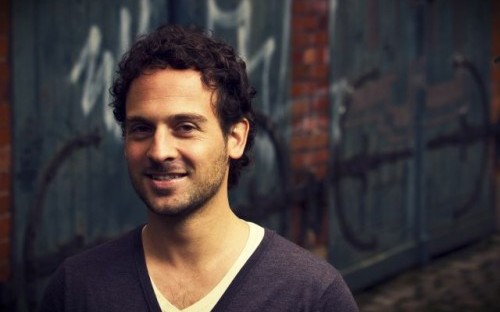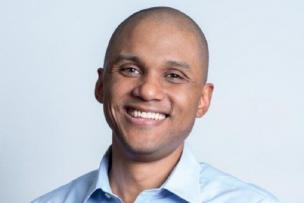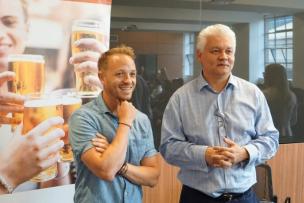Johann founded Rheingau Founders (previously Rheingau Ventures) in 2009 with partners Kai Hansen and Philipp Hartmann. The three met at Germany’s EBS Business School in 2005, but they’re already pretty seasoned entrepreneurs having started four companies together, all of which attracted VC funding. Now they’re using their experience to incubate other start-ups.
There are nine firms in the Rheingau Founders portfolio, with a total headcount of 500. When we spoke to Johann he had just stepped out of a board meeting for their fast-growing online food delivery service Lieferando.de, which just raised €15 million in funding from Macquarie Capital Group. The partners are always on the lookout for founders of new firms, as well as people to fill key finance, sales and marketing roles, many of who are business grads
A founder team is typically composed of three people, says Johann: a Chief Technology Officer (CTO) who will have studied a subject like Informatics or “programmed for half his life”; a sales- or marketing-oriented person, depending on whether the business is B2B or B2C; and a third person who is finance-oriented.
Johann says that Rheingau Founders “love graduates of Anglo-Saxon business schools”, as they’re not afraid to get their hands dirty and have often turned their ideas into real businesses while at school.
They don’t hire many people from corporates: banking and consulting experience is preferred. A lot of the finance hires have graduated from business school and then spent a couple of years in investment banking. For the sales and marketing roles, Rheingau Founders look for grads who have worked in consulting or at a big internet company.
If you’re pitching a business idea to Rheingau Founders, make sure you sell yourself as much as your business plan. According to Johann: “Normally we don’t like the idea but we like the people.” It’s usually a finance person who comes to them with an idea first, and then they look for a CTO and marketing person to complement him or her.
They look for talent through their LinkedIn networks, at internet fairs and conferences, through universities and also through their own founders.
The firms they invest in have three key things in common, says Johann. They’re all internet and mobile firms. They’re also transaction-based, meaning they earn revenue by selling a product or service. “We don’t do pure advertising plays,” he says.
Their firms also all have either a strong B2C marketing, or B2B sales strategy. Rheingau Founders have built up so much expertise in areas like SEO (Search Engine Optimization) and SEM (Search Engine Marketing) over the years that they’ve set up their own online marketing agency, electroseo, and a sales agency, Wendero. Johann describes them as akin to a profit centre or department within a larger firm, providing the sales and marketing backbone for all Rheingau start-ups.
The agencies are just one way Rheingau Founders supports its firms. Other support includes recruiting the first 10 to 20 people, creating a clean legal set-up, mediating with partners and clients, creating sales structures and recruitment processes and free office space in Rheingau’s incubator in Berlin.
Rheingau invests around €250,000 in seed funding, with the founders retaining at least 50% ownership – much higher than at other incubators like Rocket Internet.
And of course, there’s the collective knowledge of the Founders: “We’ve made many mistakes that we’ve learned from,” says Johann. “Obviously we always make mistakes, but there are certain things we know how to avoid. We’re focused very much on the early stages of a company, when there’s the most risk of things going wrong.”
All this support, says Johann, accelerates the growth of a start-up by at least a year: “When you start an enterprise, the biggest cost is usually the opportunity cost of missing out on a well-paid job.” Cutting that by a year is a major saving.
The incubator phase lasts for six to 12 months, at which point the Rheingau Founders search for and negotiate with venture capitalists to raise “Series A” funding, which often sees the firm grow from 15 or 20 people to 50 or 60 people within a year. At this stage the firms also move into their own offices. Rheingau’s nine portfolio companies have raised a total of €35million in follow-on financing so far.
That’s a lot of support from a team who are pretty young themselves: Johann is 31 and Hansen and Hartmann are both 29, an age at which many entrepreneurs are only just dipping their toe in the water. But the trio have earned their start-up spurs since they met at EBS Business School in 2005, having started four companies together, the first of which went bust.
Johann met Hansen and Hartmann when he was a doctoral student and lecturer at EBS Business School near Frankfurt, and Hansen and Hartmann were his students. Johann wanted to be an entrepreneur and even ran his own events business before university. However, as he put it, with, “no business idea, no network, no money and no idea how to run a start-up” he decided to pursue doctoral research with the EBS Business School Chair of Entrepreneurship, hoping that it would buy him time and connections.
He presented at business plan competitions around the world and met entrepreneurship professors at business schools like INSEAD and Babson College in the US, which eventually led him to his first business angels.
The team managed to raise €2 million to start sportme, a social network for sports people. It was a tough experience. They were working non-stop and earning only €400 per month. Johann had a job offer from a private equity firm but chose to work on the start-up. After struggling to gain traction, the firm eventually went bankrupt in 2009.
However, even though the venture had failed, their investors saw that they had tried hard and “put everything into it to make it successful.” Some of their investors then gave them money for a second start-up, the successful mobile advertising marketplace Madvertise, which also attracted serial investor and internet guru Lukasz Gadowski.
Their third start-up was the now famous food delivery site Lieferando.de, which Hansen still runs together with his two co-founders, Jörg Gerbig and Christoph Gerber.
The first company that the Rheingau team started without taking the role of managing directors themselves was Customer Alliance, a software tool for hotels to manage their customer reviews. For Customer Alliance they convinced Moritz Klussmann, Torsten Sabel and Chanyu Xu to come on board as management team - the Rheingau Founders then supported them in the background as co-founders, setting up the processes and aquiring venture capital. One of the reasons the Rheingau Founders decided to start incubating start-ups rather than running them, says Johann, is because all three are “MBA types".
“You don’t need three business minds in one company,” he says. In the early stages of their start-up careers their lack of technical expertise was a big problem, though they now know how and where to recruit the right technical people to join their teams. “We started Rheingau so that we can still work together, but split our efforts between several companies rather than just one.”
So far they haven’t sold any of the companies that they’ve started in full, but the three partners have sold some of their shares in three of the firms to later-stage investors, realizing six-figure exits that provided a “very nice” multiple on their initial investments.
We of course asked Johann about Lieferando.de, the meal delivery platform that’s helping cooking-phobic Germans order doners, burgers and pizzas galore from their favourite local takeaways online.
The company recently raised €15 million in funding from Macquarie Capital Group, but its main rival Delivery Hero (which Lieferando has accused of organizing cyber-attacks on its site) has raised a similar amount, and there are other players in the market too.
As consumers shift from placing food orders by phone to placing them online, competition between online platforms is fierce. But Johann is convinced that in a fast-growing market there is room for several profitable players: Lieferando.de’s turnover grew nine-fold in 2011 and is expected to grow six- to nine-fold this year.
In the meantime, he’s enjoying some of Berlin’s more exotic food offerings. The most popular dishes on Lieferando are things like spaghetti bolognese and currywurst, but the last meal Johann ordered was a Thai massaman curry!
Read more about MBA jobs and recruiters here
RECAPTHA :
1d
55
16
5b







